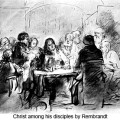Let’s remind ourselves of what we’ve read recently and just how short of a biblical timeline has transpired. Last night, Peter, James, and John witnessed the transfiguration. This morning they came off the mountain and saw a large crowd and a man asked Jesus to do what His disciples could not – cast out the demon possessing his only son. Immediately after this exorcism Jesus said to His disciples “pay attention to what I’m telling you.” They didn’t understand what He said so, naturally, they began to argue among themselves as to which of them was the greatest. Jesus spoke to them again and set them straight on “greatness.”
When we read these pericopes at the rate of one a day it’s easy to forget that the Transfiguration was last night and that it probably isn’t even lunch time yet today. The last thing Jesus said was “Whoever receives this child in my name receives me … the one who is least among all of you is the one who is the greatest.” (Lk 9:48) Let’s listen to the response from His disciple, John.
49 Then John said in reply, “Master, we saw someone casting out demons in your name and we tried to prevent him because he does not follow in our company.”
50 Jesus said to him, “Do not prevent him, for whoever is not against you is for you.”
John seems to have keyed in on Jesus saying “whoever receives this child in my name” and so he says “Master, we saw someone casting out demons in your name.” (Emphasis added.) The disciple tells us that the problem with this other exorcist was that he wasn’t one of them. John didn’t say “He doesn’t follow your ways”. Instead he can be understood to say “he’s not part of the group.” John may have a valid concern. If this exorcist isn’t part of the group then he’s probably been missing a lot of teaching.
I don’t know about you, but initially I found Jesus’ reply a bit curious. He said “whoever is not against you is for you.” This seems like a twist on the familiar phrase “whoever is not for us is against us.” But why? Why is it that if the other exorcist isn’t opposed to the disciples, then he is with them?
To answer this I want to look into “worldly” values. The way of the “world” is that everyone looks out for himself. It promotes greed and fosters envy. The way of the “world” is hedonistic and discourages moderation. It promotes selfishness and discourages self-reproach. Fundamentally, the “world” is opposed, in every respect, to the way of Jesus. One cannot adhere to worldly ways and be indifferent to Christianity. In our day and age, just as in Jesus’ time, Christian values are an affront to the self-centered values of the world. In my estimation, anyone who encounters Christianity is either drawn to it, or repulsed by it. To me, it is for this reason that Jesus says “whoever is not against you is for you”. Because whoever is not repelled by Christian values will be opposed to worldly values.
Understood in this light perhaps Jesus could have said it either way. That is, when there is no middle ground “whoever is not against you is for you” is essentially equivalent to “whoever is not with us is against us”. In fact, if we look at Mt 12:30 we can see that Jesus said it pretty much the second way when addressing the Pharisees.
Our prayerful response can be to ask for the grace to know who we are and what we believe. We can ask ourselves if the testimony of our lives pits us against the self-centered ways of the world or against Jesus. When we have to answer “no” (after all, sometimes we stumble) we can pray for the gift of fortitude to recommit ourselves to our Christian values.
Related PostsScripture texts in this work are taken from the New American Bible, revised edition© 2010, 1991, 1986, 1970 Confraternity of Christian Doctrine, Washington, D.C. and are used by permission of the copyright owner. All Rights Reserved. No part of the New American Bible may be reproduced in any form without permission in writing from the copyright owner.




